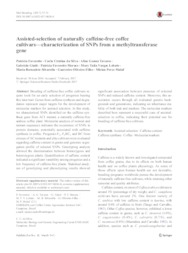Assisted-selection of naturally caffeine-free coffee cultivars-characterization of SNPs from a methyltransferase gene.
Assisted-selection of naturally caffeine-free coffee cultivars-characterization of SNPs from a methyltransferase gene.
Author(s): FAVORETTO, P.; SILVA, C. C. da; TAVARES, A. G.; GIATTI, G.; MORAES, P. F.; LOBATO, M. T. V.; SILVAROLLA, M. B.; OLIVEIRO FILHO, G.; MALUF, M. P.
Summary: Breeding of caffeine-free coffee cultivars require tools for an early selection of progenies bearing this later trait. Genes from caffeine synthesis and degradation represent major targets for the development of molecular markers for assisted selection. In this study, we characterized SNPs identified on the caffeine synthase gene from AC1 mutant, a naturally caffeine-free arabica coffee plant. Molecular analysis of normal and mutant sequences indicates the occurrence of SNPs in protein domains, potentially associated with caffeine synthesis in coffee. Progenies F2, F1BC1 and BC from crosses of AC mutants and elite cultivars were evaluated regarding caffeine content in grains and genomic segregation profile of selected SNPs. Genotyping analysis allowed the discrimination between homozygous and heterozygous plants. Quantification of caffeine content indicated a significant variability among progenies and a low frequency of caffeine-free plants. Statistical analyses of genotyping and phenotyping results showed significant association between presence of selected SNPs and reduced caffeine content. Moreover, this association occurs through all evaluated genetic backgrounds and generations, indicating an inheritance stability of both trait and markers. The molecular markers described here represent a successful case of assistedselection in coffee, indicating their potential use for breeding of caffeine-free cultivars.
Publication year: 2017
Types of publication: Journal article
Unit: Embrapa Coffee
Observation
Some of Embrapa's publications are published as ePub files. To read them, use or download one of the following free software options to your computer or mobile device. Android: Google Play Books; IOS: iBooks; Windows and Linux: Calibre.
Access other publications
Access the Agricultural Research Database (BDPA) to consult Embrapa's full library collection and records.
Visit Embrapa Bookstore to purchase books and other publications sold by Embrapa.

